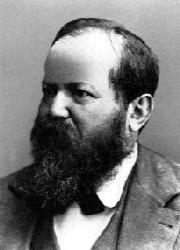Wilhelm Steinitz Biography

Wilhelm Steinitz was born on May 17, 1836, in Prague, which was then part of the Austrian Empire. He began playing chess in his youth and quickly became one of the strongest players in Europe.
Steinitz began his chess career as a professional player in 1858, earning his living by giving lessons and playing matches. He won his first major tournament in London in 1862 and went on to win several more prestigious events over the next few years.
In 1866, Steinitz played a match against Adolf Anderssen, who was widely considered to be the strongest player in the world at the time. Steinitz won the match convincingly, establishing himself as the new leading player in the chess world.
Over the next decade, Steinitz continued to dominate the game, winning numerous tournaments and matches against the best players of his time. In 1886, he played a historic match against Johannes Zukertort to determine the first official World Chess Champion. Steinitz won the match decisively, becoming the first player to hold the title.
Steinitz continued to play at a high level for several more years, but his dominance began to wane as younger players emerged with new ideas and techniques. He moved to the United States in 1883 and became an American citizen in 1888.
In his later years, Steinitz struggled with financial and personal problems and died in poverty in New York City on August 12, 1900. Towards the end of his life, Wilhelm Steinitz suffered from mental illness, which was believed to be syphilis-induced.
According to various sources, including chess historian Edward Winter, Steinitz exhibited symptoms of paranoia, delusions, and irrational behavior. In 1899, Steinitz was admitted to a mental institution in New York City, where he remained until his death the following year. During this time, he reportedly believed that he was still the World Chess Champion, despite having lost the title several years earlier.
Some sources suggest that Steinitz's mental decline may have been exacerbated by his financial troubles. After losing the World Championship title to Emanuel Lasker in 1894, Steinitz struggled to make ends meet, and he reportedly became increasingly embittered and resentful towards the chess establishment.
Despite the challenges he faced in his later years, Steinitz's contributions to the game of chess are widely recognized and celebrated. He is remembered as one of the greatest players of all time and as a pioneer of modern chess strategy and theory.
It has been reported that Wilhelm Steinitz believed that he had played chess with God. According to various sources, including the book "The Oxford Companion to Chess" by David Hooper and Kenneth Whyld, Steinitz's delusions included the belief that he was in communication with higher powers, including God.
In an interview with the Brooklyn Daily Eagle in 1899, shortly before he was admitted to a mental institution, Steinitz reportedly said:
"I have had several conversations with God lately, and He has told me that He is going to arrange a match for me with Lasker, which I am certain to win. I have been told that I will be restored to my former greatness, and I firmly believe it."
This statement suggests that Steinitz believed that God had promised him a rematch with Emanuel Lasker, whom he had lost the World Chess Championship to in 1894.
It's worth noting that Steinitz's mental illness was likely the result of syphilis, which he had contracted earlier in life. The disease can cause a range of neurological symptoms, including delusions and psychosis.
Sources:
- "Wilhelm Steinitz" by Edward Winter in Chess History and Reminiscences (1981)
- "Wilhelm Steinitz: The Father of Modern Chess" by Bill Wall (2008)
- "Wilhelm Steinitz" by David Hooper and Kenneth Whyld in The Oxford Companion to Chess (2nd ed., 1992)
- "The Tragic End of Wilhelm Steinitz" by Dylan Loeb McClain in The New York Times (2014)